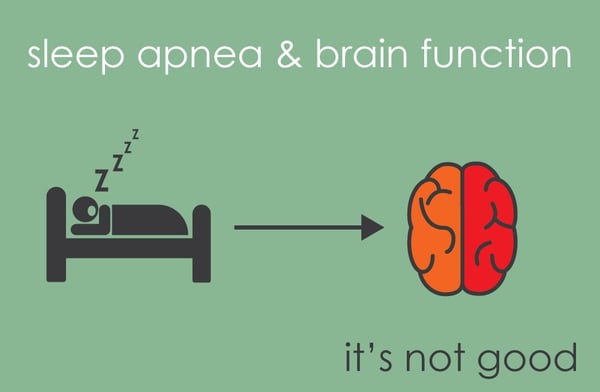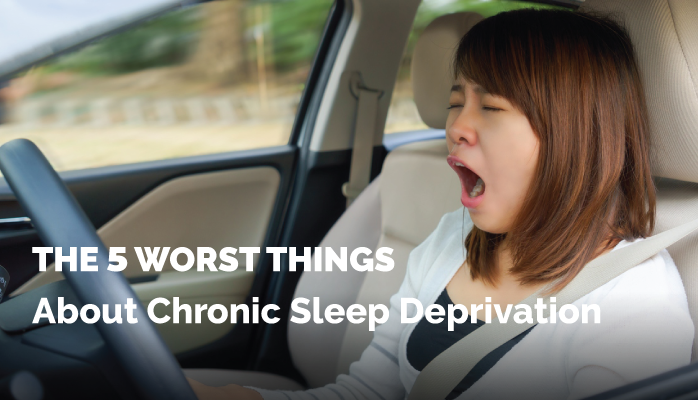What Chronic Sleep Deprivation Is
Chronic sleep deprivation is sleep deprivation over a long period of time. It can have catastrophic effects on health and performance in all areas of life, and should be taken very seriously. Sleep deprivation is caused by not getting enough sleep. “Enough sleep” will be different for different ages and individuals, but if you aren’t getting the sleep you need, you will become sleep deprived.
Chronic sleep deprivation is different from acute sleep deprivation in that acute sleep deprivation:
- Does not last long, such one night to a couple of weeks
- Usually has a known cause
Chronic sleep deprivation may or may not have a known cause. But it usually entails getting less than the required amount of sleep most or every day, which may be followed by binge sleeping and exhaustion.
Adults need about 7-9 hours of sleep per day. You will likely require sleep within this range depending on your lifestyle and unique needs. Numerous studies show that getting less than 7 hours of sleep per day (this includes naps) has negative side effects on nearly everybody.
The severity of your chronic sleep deprivation, which can be moderate or severe, will depend on how much less sleep you are getting than you need.
The 6 Worst Things About Chronic Sleep Deprivation
Symptoms of chronic sleep deprivation can be subtle or marked, depending on both the severity of sleep deprivation and the personality of who is affected. But often, symptoms are noticeable by the sleep deprived and their loved ones. Here are common symptoms.
1 - Lower performance at life
People with chronic sleep deprivation perform lower in most areas of life:
- Sense of happiness and well being
- Work
- Academics
- Athletics
- Work outs
- Relationships
- Weight maintenance
2 - Fatigue and exhaustion
Fatigue and exhaustion are usually the most obvious signs of chronic sleep deprivation. This takes the form of:
- Chronic daytime fatigue and lethargy
- Trouble staying awake at the wheel
- Headaches
- Inability to really go work out or play in athletics
- Sudden sleep attacks during the day (the overwhelming desire to sleep, can’t keep your eyes open)
- Clinical exhaustion where the body begins to break down (hair falling out, for example)
3 - Cognitive dysfunction

Sleep disorders such as sleep apnea, which can cause chronic sleep deprivation, can lead to chronic cognitive dysfunction
Chronic sleep deprivation can also significantly reduce your cognitive ability in the following ways:
- Chronic brain fog
- Trouble concentrating or staying on topic
- Trouble learning
- Trouble with memory, such as forgetting simple things
- Slower, less efficient, and worse at performing cognitive tasks, such as at work
If severe enough, cognitive dysfunction will be noticed by teachers and employers.
4 - Emotional dysfunction
Chronic sleep deprivation can seriously disrupt emotional regulation and hormones, leading to:
- Depression
- Chronic anxiety
- Chronic irritability and anger issues
- Inability to manage and respond healthily to stress
- Other mood troubles
5 - Sexual problems
Physical and emotional energy also play important roles in maintaining libido. Sleep deprivation can steel libido energy for men and women alike, leading to reduced sex drive and sexual trouble.
For men, chronic sleep deprivation can have even more impact. Men replenish testosterone during sleep. Without testosterone, men are at great risk for suffering from erectile dysfunction and further reduced sex drive.
Studies show that sleep problems often lead to sexual problems for men. One study, for example, found that in 531 men, patients who slept 4 hours or less had half as much testosterone as patients who sleep 8+ hours. Other studies have been remarkably consistent with their findings, with several other studies citing the ED sleep apnea link at 40%, 46%, 61%, 64%, and 69%.
What Causes Chronic Sleep Deprivation?
Usually, chronic sleep deprivation is caused by one of a few things:
- A sleeping disorder (discussed below)
- Medical conditions and diseases
- Chronic pain
- Chronic life stressors or lifestyles (i.e., shift work)
- Natural changes (we sleep differently as we get older)
- Here in Alaska, the extreme lighting conditions also can cause chronic sleep deprivation
Sleep disorders by definition cause sleep deprivation. Common sleep disorders include:
How to Treat Sleep Deprivation?
Treating chronic sleep deprivation is dependent on several factors that are unique to you, such as the cause. But there are a few things we can all do to ensure we are setting ourselves up to get the best night’s rest:
- Have a restful room
- Set a bedtime routine
- Limit coffee and alcohol consumption
- Keep a sleep diary
Beyond this, work with your doctor of a sleep specialist to try and get back to nights of quality sleep. If you live in Alaska and are chronically sleep deprived, start by taking this free online sleep test.


